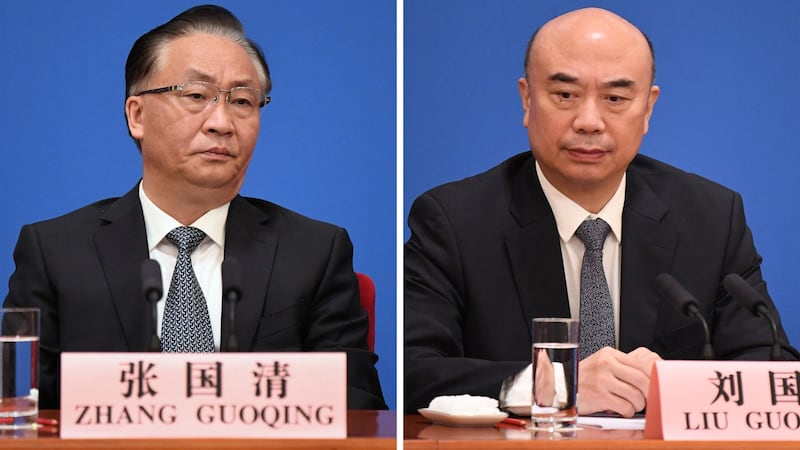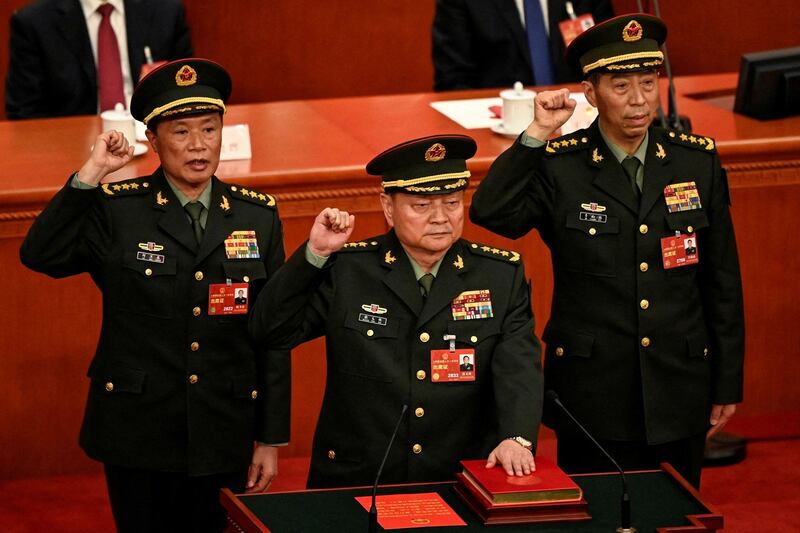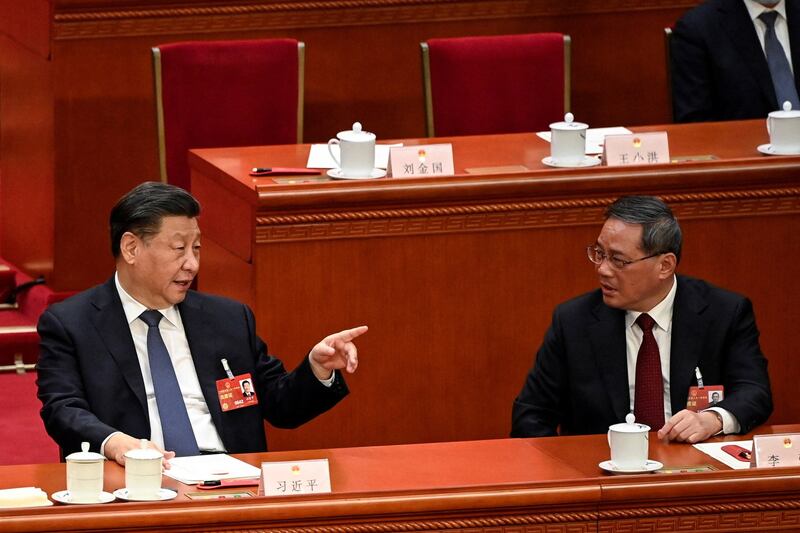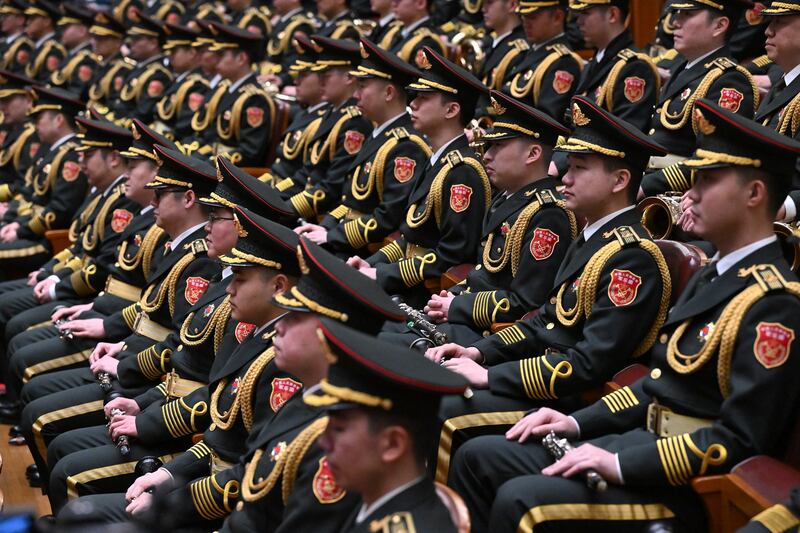China's rubber-stamp parliament closed on Monday after appointing a new premier and four vice premiers – two of whom have close ties to the military-industrial complex – as Communist Party leader Xi Jinping called repeatedly for a “world-class” technological upgrade for the People’s Liberation Army.
Xi's speech comes after a government restructuring that will put control over China's people and resources more firmly in the hands of Xi and other top party leaders, a move that some analysts have suggested is part of ongoing preparations for a potential war.
Two of China’s new vice premiers – Zhang Guoqing and Liu Guozhong – are former high-ranking personnel in military-linked companies, while incoming defense minister Li Shangfu is a current member of the party's Central Military Commission, the highest-level military command structure, who once worked in China's satellite program.
Li is currently under U.S. sanctions over the purchase of combat aircraft and equipment from Russia’s main arms exporter, Rosoboronexport.
“Without holding the status of state councilor or vice minister, it’s not always easy to get things done when dealing with the military,” Australia-based scholar Feng Tianben said. “It looks as if they are tightening control over the military, rather than relaxing it.”

Development of defense technology
Shen Ming-shih, acting deputy chief executive officer at Taiwan’s Institute for National Defense and Security Research, a government think-tank, said Li’s appointment has effectively upgraded the defense minister’s job.
“Defense minister used to be a fake post with no real power, because all of the real power lay with the Central Military Commission,” Shen said. “So it’s very meaningful that he is getting this post -- it means [Xi] values the role and function of the post, as well as Li’s work.”
“The significance of his taking over as defense minister lies with his background in the defense industry ... which shows that Xi Jinping thinks the development of China’s military equipment and defense technology is extremely important,” Shen said.
Feng Tianben said the government seems far more concerned with integrating its leadership with the People’s Liberation Army than under previous administrations.
“The focus is on the military-industrial complex,” Feng said of the new appointments. “This is in line with the [overall strengthening] of the military.”
“This priority has now been reflected in the team-building at the highest level of leadership, and means they will be coordinating with the defense ministry, as well as coordinating production,” Feng said.
“If they’re going to build a third military superpower along the lines of the United States and Russia, they need to have the weaponry to back up their rhetoric,” he said.
According to publicly available information, Zhang started working for Norinco, which has close ties to the People's Liberation Army, as a project manager, serving for a while in the Middle East before rising to serve as vice president and deputy Communist Party secretary at the party-controlled company.

Building a ‘world-class army’
Another vice premier, Liu Guozhong, studied trigger fuse design and manufacture in the artillery shell department of the East China Institute of Engineering in 1978.
By 1982, he was an official in a China Ordnance Industry Corp. factory.
During his closing speech on Monday, Xi mentioned “strengthening the military” eight times, vowing to “accelerate the building of the People’s Liberation Army into a world-class army.”
The other two vice premiers are Xi loyalists who will be in charge of running the economy, with Ding Xuexiang seen as next in line for the premiership and He Lifeng to be charged with economic, financial and industrial affairs, according to senior journalist Wang Haiyan.
He said the moves look more like the militarization of government than enhanced political controls over the military, however.
“He Lifeng and the two vice premiers with the ordnance industry background are the ones who will actually do any work,” Wang said. “[This means that] half of the State Council has now been taken over by the military.”
Meanwhile, public security minister Wang Xiaohong has been promoted to a higher rank in the State Council, highlighting his role as the country's top cop and " stability maintenance" czar, charged with protecting the party's hold on power against domestic threats and political unrest.
According to a commentary on the Brookings Institution website, loyalty to Xi is a requirement for promotion, and many of the members of the newly sworn-in State Council have longstanding ties to him.
Li Qiang has worked with Xi for decades, acting as his top aide and chief of staff in the Zhejiang provincial party committee, with Ding Xuexiang playing a similar role when Xi was party chief in Shanghai.
Wang Xiaohong was a high-ranking member of the police bureau in Fuzhou when Xi was a top leader there, while He Lifeng’s relationship with Xi dates back four decades to when they worked together in Xiamen, the commentary said.

Looking toward Taiwan
Veteran journalist Zhao Wushun said few of the new appointees have much experience in government.
“Few of these people have substantial work experience,” Zhao said. “When they encounter problems at work, conflicts will arise.”
Xi, who was recently sworn in for a precedent-breaking third term as president, also told National People’s Congress delegates that the party would “implement the party’s overall strategy for resolving the Taiwan issue ... and unswervingly advance the process of reunification of the motherland,” in a reference to China’s territorial claim on democratic Taiwan, which has rejected the claim, having never been ruled by the Chinese Communist Party nor formed part of the 73-year-old People’s Republic of China.
Premier Li Qiang’s inaugural news conference suggested Beijing would be employing both hard and soft power initiatives to strengthen Beijing’s influence in Taiwan, whose 23 million residents have repeatedly rejected the idea of Chinese rule under the “one country, two systems” framework used to take back control of Hong Kong and Macau.
“We share an unbreakable bond of blood and kinship [with people in Taiwan],” Li said. “We will ... encourage more Taiwan compatriots and businesses to come to [China].”
“We hope they will be willing not just to come [here], but to integrate into local communities,” he said, pledging to work for the “restoration of normal exchanges and regular cooperation” with Taiwan, in the wake of growing tension with Washington and intensified Chinese military exercises around Taiwan in recent months.
Xi’s speech came after party ideologue Wang Huning, a member of the seven-member all-powerful Politburo standing committee and a close Xi ally, took the chair of the Chinese People’s Political Consultative Conference national committee on Friday, with a call for political “struggle.”
He told the advisory body, which works closely with the party’s outreach and influence arm, the United Front Work Department, to “carry forward the spirit of struggle,” strengthen its “fighting skills,” and “take a clear stance on matters of right and wrong.”

Wang is also expected to head the Taiwan Work Leading Group, responsible for formulating actual Taiwan policy and for United Front work relating to the island, which has constantly been targeted by Chinese psychological and influence operations in recent years.
Li told the news conference on Sunday that his administration would "unswervingly deepen reform and opening up" despite a string of recent moves favoring the state sector over private enterprise under his boss Xi Jinping in recent years.
But he warned that a 5% economic growth rate for this year wouldn't be easy to achieve.
Translated by Luisetta Mudie. Edited by Matt Reed.
